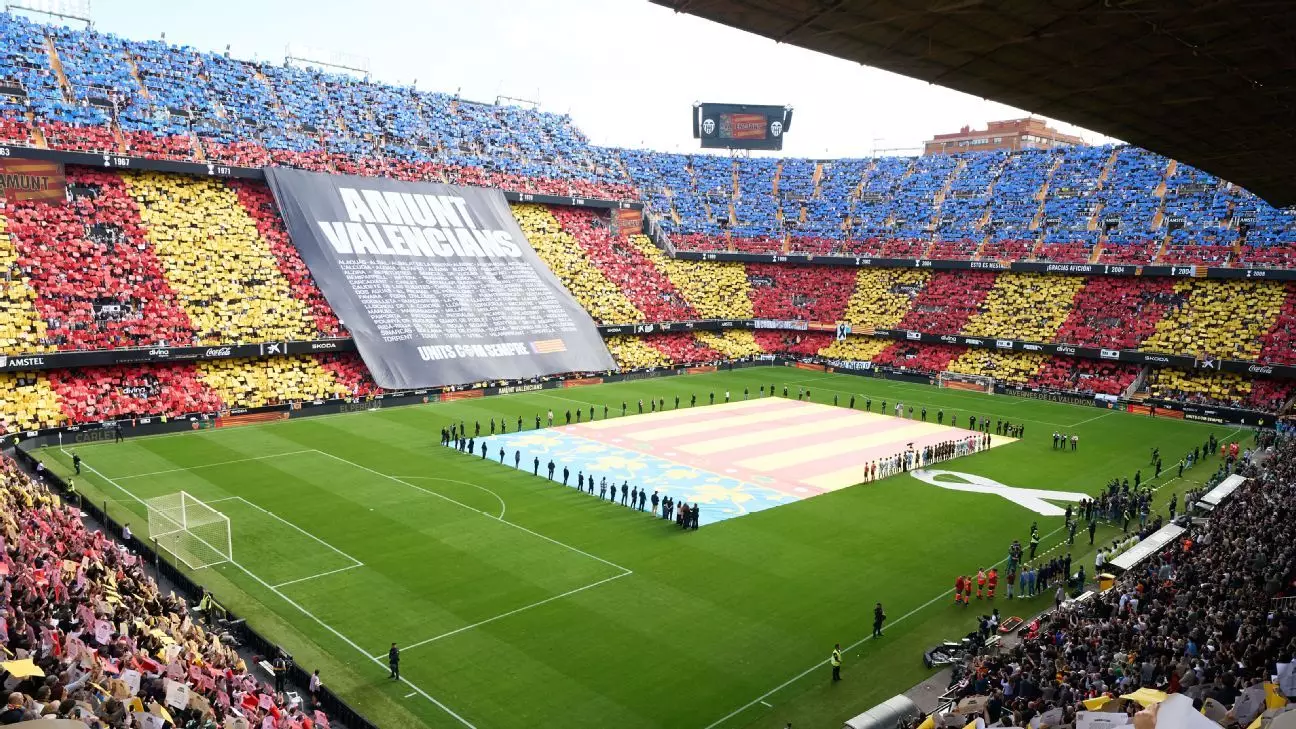On a sobering Saturday afternoon, Valencia CF faced Real Betis in what became more than just a football match; it was a poignant moment of collective grief and hope, following catastrophic floods in the region that claimed at least 221 lives. This emotional encounter at Mestalla marked Valencia’s return to competitive action after postponements of previous matches due to severe weather conditions unleashed on October 29. While the scoreboard reflected a 4-2 victory for Valencia, the significance of the day transcended mere statistics, as the club sought to provide solace to a community reeling from loss.
In the hours leading up to the match, the mood among players and fans was heavy with emotion, as both groups paid tribute to the victims and those affected by the floods. Valencia’s management used this sporting event as an opportunity to raise funds, promising that all match-day revenue would support recovery efforts in devastated towns. The players donned black kits instead of their traditional white, enhancing the atmosphere of mourning and respect. Before kick-off, a sea of black covered the pitch as a giant Senyera flew, symbolizing their unwavering connection to the region.
Valencia coach Ruben Baraja articulated the sentiments of the day, admitting, “It may well be the most emotional moments I’ve experienced in football,” hinting at the profound nature of their undertaking. These statements shed light on the broader significance of sports and their potential to foster a spirit of unity in times of adversity.
The players from both teams entered the pitch under a palpable air of gravity, a massive black memorial symbol accompanying them. Fans witnessed a palpable demonstration of solidarity as Valencia unfurled a massive tifo, featuring names of the towns devastated by the floods. This deeply moving display transformed the stadium into a memorial, causing tears to flow amongst players and supporters alike. “The emotions, the atmosphere, the respect at Mestalla… it gave you goosebumps,” Baraja noted, emphasizing the connection between community values and sports.
Despite the heavy atmosphere, Valencia managed to channel the collective grief into a spirited performance. After a shaky start, including an own goal from Hugo Duro that leveled the match, Valencia’s determination prevailed. Duro redeemed himself with two subsequent goals, joined by a strike from Diego López, showcasing the team’s resilience during a challenging time. The match concluded with Chimy Ávila netting a consolation goal for Betis, but the day ultimately belonged to Valencia.
With this victory, which marked only their second of the season, Valencia was lifted from the bottom of the La Liga table. This achievement represented not just immediate sporting success, but a stepping stone towards rebuilding morale within the community.
As Valencia celebrated their hard-fought victory, the realities of recovery from the floods remained stark. The club’s acknowledgment that sport can provide a platform for healing resonated not just within the confines of the stadium but echoed through the communities intertwined with the club’s identity. With the cleanup efforts still ongoing, both the city and the team face a long road ahead, as rebuilding infrastructure and lives is expected to take considerable time and effort.
The sense of unity forged through the aftermath of tragedy emphasizes how sport can be a medium for support and resilience in facing calamity. With the winds of recovery slowly beginning to blow, Valencia is more than a club; it is a lifeline for many struggling to reclaim their lives in the wake of destruction.
Valencia’s match against Real Betis was not merely a return to the pitch; it symbolized a promise—a promise to stand alongside those in grief, emphasizing their role in rebuilding a community devastated by natural disaster. While the victory gleamed brightly against tragic circumstances, it reminded all that sports could transcend the realm of competition, influencing healing and revival.

Leave a Reply